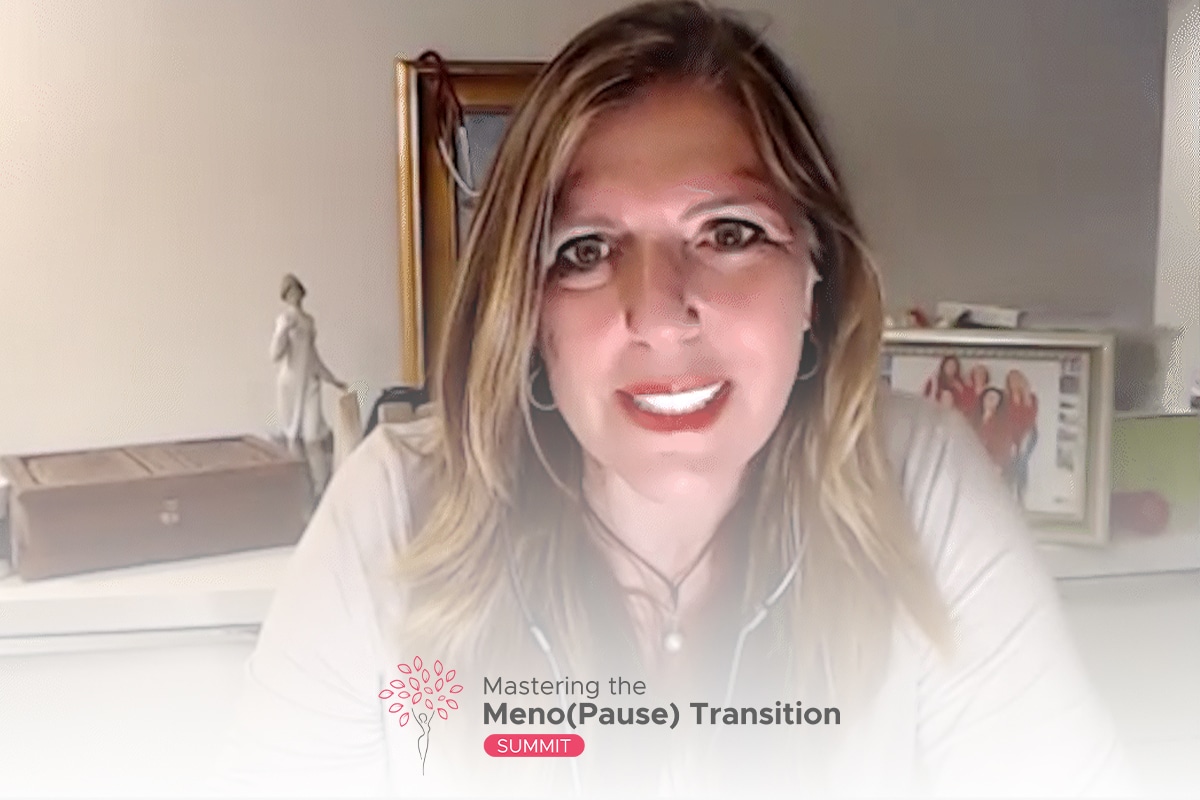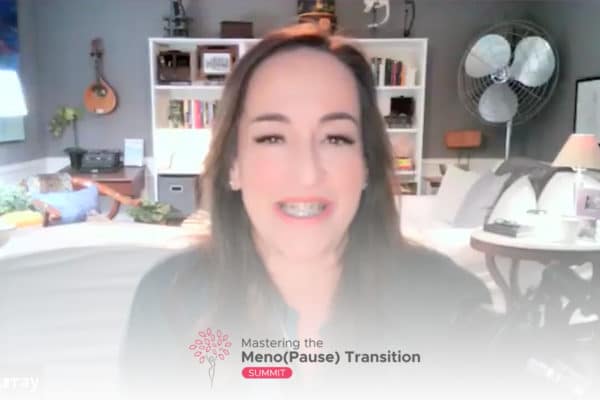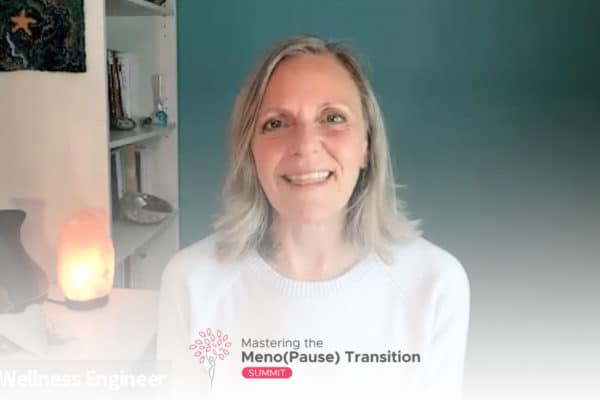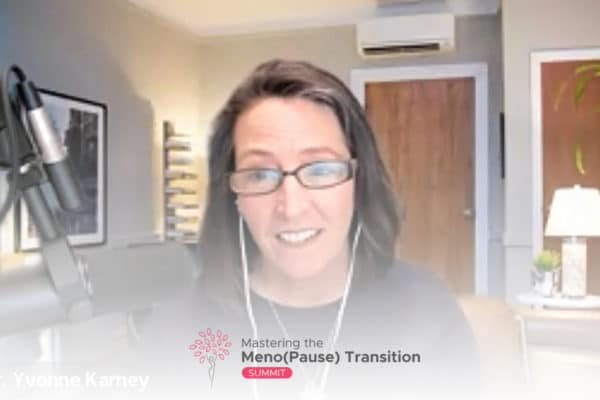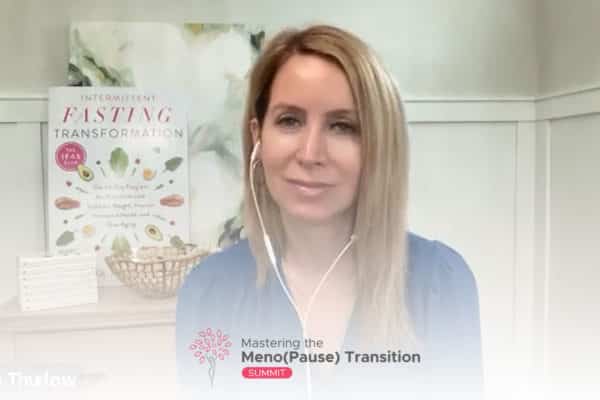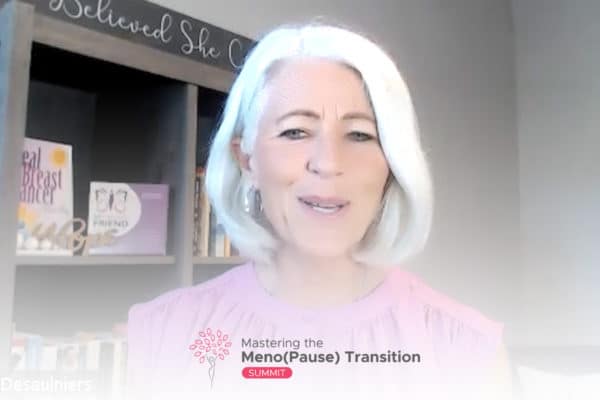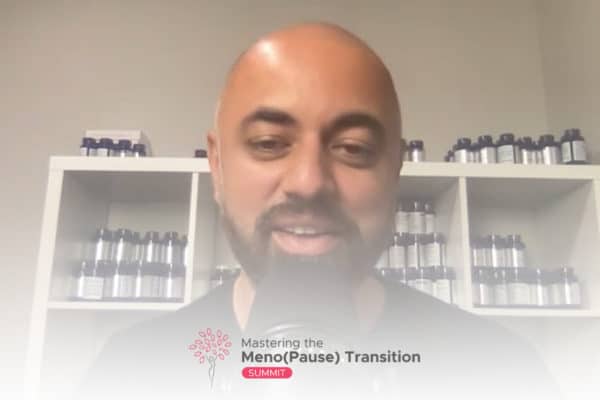Join the discussion below
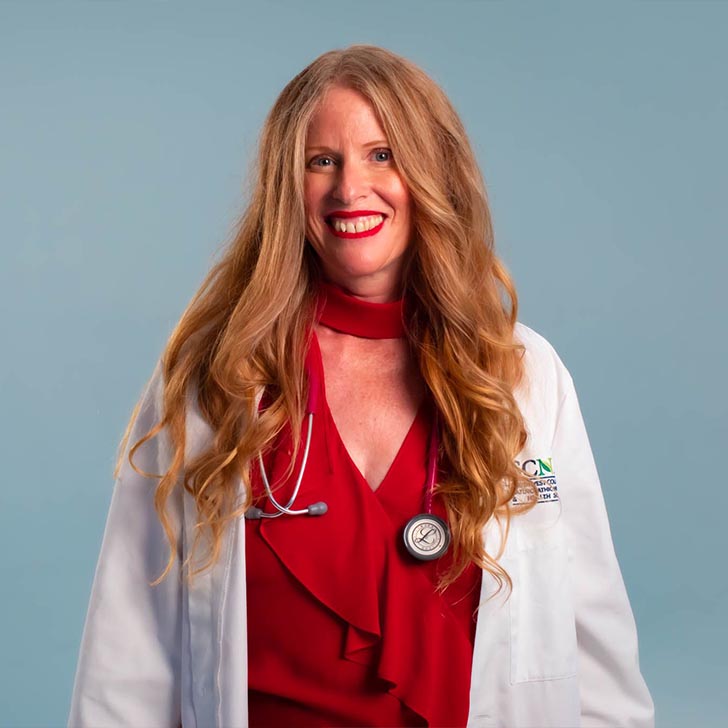
Dr. Sharon Stills is a Naturopathic Medical Doctor who helps perimenopausal and menopausal women to pause and evaluate life so they can live the second act of their story stronger, healthier, and sexier while aging backwards. Using her 20+ years of experience and extensive training and background in European Biological... Read More
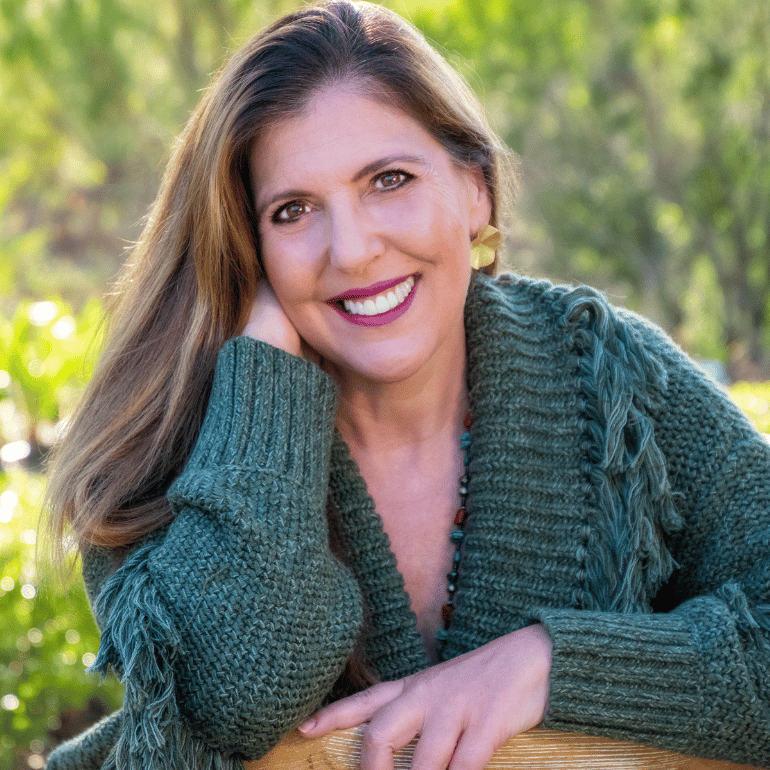
Anna Cabeca, DO, OBGYN, FACOG, is triple-board certified and a fellow of gynecology and obstetrics, integrative medicine, and anti-aging and regenerative medicine. She has special certifications in functional medicine, sexual health, and bioidentical hormone replacement therapy. For the past 20 years, she’s served 10,000+ women in her private practice— and... Read More
- Menopause as a risk factor diabetes
- Eating Keto Green to reduce Menopause symptoms and risk for diabetes
- The best diet for menopause i.e. Keto Green
Related Topics
Alkaline, Alkalinizers, Blood Sugars, Diabetes Risk Factor, Dysfunctional Bleeding, Food As Medicine, Health, Hemoglobin A1c, Hysterectomy, Insulin Resistance, Insulin Sensitivity, Joyful Transition, Keto, Keto-green Detox, Keto-green Lifestyle, Ketosis, Menopause, Menopause Misery, Removal Of Ovaries, Second Spring, Womens HealthDr. Sharon Stills
Hi, everyone. Welcome back to Mastering the Menopause Transition Summit. I’m your host, Dr. Sharon Stills. Pleasure to be with you all, learning all that we can do as we go through our hormonal journey. And today I have a very special guest with me today who is all things menopause, so you’re in for a treat. My guest is Dr. Anna Cabeca. She’s a triple board certified and a fellow of gynecology and obstetrics, integrative medicine, and anti-aging and regenerative medicine. She has special certifications in functional medicine, sexual health, and bioidentical hormone replacement therapy. For the past 20 years, she served 10,000 plus women in her private practice and millions more through her books, online videos, and articles. When her own health took a troubling turn during menopause, she sought out the wisdom of healers around the world. She learned that modern medicine and time tested natural remedies are not at odds. Working together, they create indisputable results and true wellbeing.
Using delicious healing foods and simple lifestyle changes, Dr. Anna reclaimed her health and life fueled by her belief that every woman deserves to be empowered and in control of their health and life. She developed the keto-green lifestyle, which we’re gonna learn all about, which has helped thousands of women opt out of menopause misery and experience a joyful transition to the next stage of their lives. With her methods, you too can breeze through menopause into your second spring feeling the best you ever have. Welcome, you are certainly in the right place around here. We’re excited to talk with you today and have this conversation and learn all about keto-green.
Anna Cabeca, DO, OBGYN, FACOG
Yeah, yeah, it’s been part of my journey. You know how they say your mess becomes your message? It’s certainly my truth as an OBGYN. It’s nothing I learned in medical school. And my journey had me in early menopause at 39, diagnosed with early menopause, infertility. I failed the round after round of infertility meds, and I was told I would never be able to have another child. So at 39, that really dove me down the menopause journey. And when my doctor’s bag was empty, when my Emory University doctor’s bag was empty, that journey around the world, looking at food as medicine and understanding lifestyle medicine, there’s so much more than what we write on a prescription pad and can do with a surgical knife. And in fact, it’s the first medicine to use food as medicine.
And as a result of that journey, I learned so much, but also reversed early menopause and naturally became pregnant at 41 with a baby I was told I would never be able to have. So she’s now 14, and I’m 56 this month. And I’m a grandma, and I’m just loving I’m at the best stage of my life. And I want everyone to claim that health. I mean, Sharon, I saw my mom suffer. When I was 16, she was 52, diabetic, heart disease, undergoing cardiac bypass surgery, all of these things. Like she never had to suffer like that. And I really made it a commitment. My commitment, my passion in life is that no woman suffers, that they feel empowered over their body. They’re not giving that power away to a prescription pad, to a surgical procedure, anything, that we have that power within ourselves first to heal. With the right strategies, we can do that.
Dr. Sharon Stills
Exactly, exactly. I use my prescription pad to write go to the beach, take a vacation, drink more water, to put the important things that are really medicinal rather than the pharmaceuticals that we-
Anna Cabeca, DO, OBGYN, FACOG
Oh, I always write orgasm on mine.
Dr. Sharon Stills
Yeah, that’s one too, for sure. So that’s such a great empowering story, because there is so much suffering that is not necessary if women are empowered, which is why we’re doing this summit to really spread the message and let women know in my world, in my practice, it’s like it’s just commonplace. We all have amazing menopausal transitions, but it’s so sad to think that we are just such a small piece and that the mainstream has no idea that this can be a really empowering time where you can actually… I feel better that 54 then I felt when I was 24. I feel like as we get older, we can really harness our health. So speaking of health, we’re gonna talk about diabetes and how menopause is a risk factor for that and get into your keto-green and what the women can be doing. So, why don’t we just start there and talk about… We haven’t really talked about diabetes on the summit yet, so I’m excited to have this conversation here.
Anna Cabeca, DO, OBGYN, FACOG
Yeah, yeah, so I think that that’s really key, and it’s not that we understood, and certainly not something I learned that menopause is a risk factor for diabetes. I mean, that crazy? Menopause is a risk factor for diabetes, what? Well, even more so, Sharon, recently research showed that women who have had their uterus removed, who have had a hysterectomy, have an increased risk for diabetes. Women who have had their ovaries removed have an even more significant increased risk of diabetes. Whoa, right? To me, that’s like, whoa, what you mean? Like I never consented a patient when I’ve gotta do your hysterectomy, I’ve gotta remove your ovaries, that’s gonna increase your risk of diabetes. I didn’t consent a patient that way, not to mention dementia and Alzheimer’s. No, I didn’t know that to consent a patient. I looked at this research and I’m like, okay, what’s really fascinating, and it stems into my entire clinical practice. And I’ll start with an example, ’cause I know we’re gonna get into some science, but I wanna share real life story.
And in my medical practice as a gynecologist and obstetrician, I mean, I love to operate. I could help a patient get rid of their symptoms really, really quick. Well, as I went through my own journey, reversed early menopause, and all those symptoms, I started doing things differently. So my patients would come in, irregular bleeding, severe PMS, being miserable at their period every month. And really like we try birth control pills. We can try antidepressants, but ultimately that would lead them down the road to a hysterectomy. And if they were over age 35, we were told, we’ll take their ovaries out, so they don’t get that very minuscule chance of ovarian cancer. And I say that with a lot of skepticism. So as I started working with patients coming in and I started giving them a version of now what I call my keto-green detox that I write about that’s in my books and food as medicine, intermittent fast, cut out the carbs and sugar, grains, gluten, dairy, increase your protein and healthy fat, and add those good alkalinizers. And I started doing that with patients, and I added maybe some adaptogens or maybe some bioidentical progesterone, but even before I did that, patients would come back six weeks later and say, “Dr. Anna, I feel better than I have in months, in years.” I love this one, ’cause I have a friend, and I swear for 10 years in my medical practice, I would tell her, “Look, I just want you to do this 21 day detox. “I promise you’ll feel…” She goes, “I’m fine.” She came back to me after she finally did it.
And I think it was like years after I’d started nagging her. And she goes, “Oh my gosh, Dr. Anna “I didn’t realize how bad I was feeling “’til I started feeling good again.” And I went from doing two to three surgeries per week to needing to do two to three major surgeries per year. Powerful, right? So then what was it? What was I doing? I was increasing insulin sensitivity, reducing their hemoglobin A1C, but without like knowing this connection with hysterectomy or with dysfunctional bleeding. So I ask with this research, does the hysterectomy and the removal of the ovaries, did that increase the risk for diabetes? There’s probably a component there, but more likely it was elevated blood sugars and insulin resistance that increased significantly their requirement of a hysterectomy. When we create that insulin sensitivity, their dysfunctional bleeding goes away. When we empower oxytocin and decrease cortisol, the stress hormone, our natural progesterone is higher. The dysfunctional bleeding goes away. I mean, that was game changing for me and my practice, and it just opened my eyes. People are watching this and not seeing this. I just moved into this house, and I’m in the quiet area in the basement. And there’s like a fly that really wants to be on camera.
Dr. Sharon Stills
Must be interested in menopause. Must be a lady fly.
Anna Cabeca, DO, OBGYN, FACOG
Oh my gosh. Oh yeah, she’s on her last leg, but I don’t know.
Dr. Sharon Stills
Yeah, it’s really fascinating how like Hippocrates said, “Let food be thy medicine and thy medicine be thy food.” There’s so much truth to it when we… We can’t get healthy if we’re not addressing what we’re putting in our mouths and how we’re absorbing it and how we’re utilizing it. So what exactly, ’cause I love that you have the green, you always hear about keto, and I come from a long training over in Europe and where I got a lot of my cancer training to work with oncology patients, and it’s all about alkalinizing. We wanna alkalinize the system. That’s doing alkaline IVs. It’s one of the big things we do. So I love that you have, ’cause you don’t really hear about keto and alkaline. You hear about keto meat and keto cheese. And so what does that mean, keto-green? That’s such a great take on it.
Anna Cabeca, DO, OBGYN, FACOG
Yeah, thank you. So it really came back from my journey getting into ketosis. So when I hit my second menopause at 48, and I was spiraling, I had every symptom, the hot flashes, the night sweats, difficulty sleeping. I slept three hours a night, I swear, and I had anxiety, depression, brain fog, mood swings, and the weight gain without doing anything different, 20 pounds without doing anything different. So experienced everything my patients were experiencing, but yet I wanted to carb restrict right away. And I knew about ketogenic diet, ’cause my oldest child has seizures. And so I knew about the ketogenic diet. I used it in my Parkinson’s patients, my patients with epilepsy, in my medical clinic, our neurologic diseases, our dementia, and I knew that really helped them. And as I started doing that, the more ketogenic diet, I just felt like I was hitting a wall. I was like, okay, within a few days not keto-flu, but I was like I just felt cranky and irritable. I’m like I’m a single mom with a wee one in elementary school, a middle schooler, and another one in high school and all girls. I was like, okay, I gotta fix this.
And I just like checked my urine pH. I told my patients so often to check your urine pH. It is a biomarker for health. The more alkaline your urine pH is, the lower your risk of diabetes, heart disease, cardiovascular disease, cancer, and inflammatory diseases. So it was like, oh my gosh, I checked my urine pH and, Sharon, the pH paper didn’t change color. It was as low as the pH paper read. So that would’ve been a pH of five, but who knows? It could have been a pH of three. I could have been peeing acid. And it was part of that ketogenic. So it was a huge aha and no wonder I don’t feel good, No wonder I just don’t feel good. And I remembered at that point, gosh, my perimenopausal patients that I put on a candida diet or a keto diet, they’d all be like, “Dr. Anna, I don’t like how I feel on this.” So I needed to understand, okay, well that makes sense. I’m very acidic. Let me add the alkalinizers in, but I’m starting to lose weight, and I don’t wanna gain a single pound back. So it’s the broccoli sprouts, the kale, the beet greens, sauteing up some beet greens, one of the most… I threw them away for all my life.
Like now I throw the beets away, and I eat the beet greens. I got some great recipes, ’cause otherwise they’re really bitter, but like dandelion, beet greens, Swiss chard, I mean low carbohydrate greens plus the crucifers, the cruciferous vegetables that help with estrogen detoxification. So I started getting really smart about combining low carbohydrate alkalinizing foods that also support hormone detoxification. And I stayed in ketosis, and my urine pH got more and more alkaline, but this is the kicker. This is why it’s more than what we eat. It’s a keto-green way or lifestyle like I like to call it. The mornings, I would do my gratitude journaling or go for a walk on the beach. I was more alkaline all day.
My urine pH was more alkaline all day. I felt better, and I felt which as a burnout single mom who was in midst of chaos at that point, I had the peace that surpassed all understanding. That physiology, that keto-green physiology is energized enlightenment. That physiology is so magical. It really is. I want everyone listening to be able to experience that, getting that alkaline urine pH and getting into ketosis at the same time. It is a magical feeling. It is an experience, and it really does, that clarity, that more spiritual connection, that more peace within your body, it’s powerful. So I needed to understand physiology. I was a physiology researcher before I went to medical school. In fact, I even helped in physiology in medical school labs, so I wanted to understand what was going on. And so it turns out cortisol increases hydrogen ion secretion across the renal tubules. So you can be eating that perfect vegan, vegetarian green diet, and be acidic, because of cortisol, stress. And so everything we do to decrease cortisol and improve… So cortisol is the most acidifying hormone in our body. It will Rob Peter to Paul, and oxytocin is the most alkalinizing hormone in our body. And for everyone listening, men and women are different when it comes to keto and with hormonal balance. Men have 10 times as much testosterone, a catabolic hormone. So they’re not experiencing the detrimental effects of a ketogenic diet by itself as quickly as we do as women and how it affects us, our hormones, much quicker as women than it does for men. And so that key concept was game changing. I’ve now had hundreds of thousands of people that have followed keto-green living. And that difference, I mean, it really is, I like the word magical lately. I’m like using my word. It’s just magical. And actually I have a program called Magic Menopause, an eight week program that I walk women through. Have been doing it since that time, 2015, when I discovered the keto-green way and had rebuilt my body and my brain. And so, yeah, it’s a good word.
Dr. Sharon Stills
I love that word too. Menopause is magic. So, how many carbs do you let the women have? Do you allow more carbs than a typical keto diet?
Anna Cabeca, DO, OBGYN, FACOG
Well, definitely we’ll add in more of the alkalinizing carbs, but I wanna get into ketosis at the same time. So with me, it’s not just about the keto-green eating plan. That’s key, but it’s with intermittent fasting of at least 13 to 16 hours. And sometimes we bump up and bump back. We want that metabolic flexibility, but there’s no snacking. And typically by the time you’re doing this for a while, you’re eating two meals a day. And that gives your body time to rest and digest. So, two or three meals a day. I’m drinking a smoothie right now, ’cause I’m doing my MenuPause cleanse, keto-green cleanse with my online group in my online community right now. So I’m drinking a protein shake right now.
So you can eat really good, beautiful meals, but you wanna make sure you’ve got a good combination, and you’re not eating between meals, and you’re allowing your body time to rest and digest. And you’re eating early enough in evening, preferably by 6:00 or 7:00 p.m., so that you can have a good deep restorative night’s sleep. So I typically say less than 40 grams of carb is… When we hit total, 40 grams of carb, that might push us out of ketosis, but if you’re not testing, you’re guessing. So for me, it’s checking I use my keto pH urine test strips that measure both ketones and pH. And so you’re looking to get into ketosis, and you wanna make sure you’re there and really focus on that alkalinity. And I always say focus on getting alkaline first. And this is like with your teaching with decreased inflammation. Get an alkaline urine pH first. That is really singularly one of the most important biohacking biomarkers that we can biohack with.
Dr. Sharon Stills
And it’s so often not discussed. I have a whole eBook that you’ll have access to, ladies, that really takes you through like the difference between your saliva pH and your urine pH and understanding how your pH fluctuates. But ultimately the goal is alkaline. We want alkaline, alkaline, alkaline, except for the places where we want to be acidic like the stomach and the vagina. So proper alkalinity means sometimes having acidity, always having acidity in other places. So you mentioned-
Anna Cabeca, DO, OBGYN, FACOG
And your skin, right? I would just say like the skin, and it’s natural the skin is more acidic. So when we’re using skincare product, because that’s our defense mechanism, the vagina naturally has a pH of 3.5 to four, 4.5, very acidic. We wanna kill bacteria and sperm, like that’s the goal. We don’t want it all to go into our womb. And the thing is, as we age, the vaginal pH becomes more alkaline. So we’re susceptible to more infections including herpes and HPV and bacterial vaginosis. So we wanna keep that vaginal pH really nice and acidic too, and that’s the things we do, diet. I use my product Julva, my anti-age cream for the vulva. I use that to increase your body’s natural moisture and decrease the vaginal pH. And of course, you’ve gotta eliminate sugars and carbs, so you’re really supporting your body’s natural defense mechanism. And of course, healthy probiotics or probiotic rich foods, that’s key to a healthy vaginal pH and first line of defense. As a gynecologist, I’m very passionate about that.
Dr. Sharon Stills
We are too. Yeah, it’s so, so important. I just wanna go back, ’cause you mentioned oxytocin and cortisol and I’d love if you dive a little more into oxytocin. I think that’s a very overlooked yet so important for health. You hear about estrogen, progesterone, testosterone, but a lot of people forget about oxytocin.
Anna Cabeca, DO, OBGYN, FACOG
Oh my gosh, this is so true, Sharon. I mean, I spent the prime years of my life and hundreds of thousands of dollars studying the reproductive hormones of estrogen, progesterone, testosterone, even DHEA. And when it comes down to it, and so I write about this in my first book, it takes more than hormones to fix your hormones. When it comes down to it, it’s not about those. When we have to adjust and like we do that in the keto-green way, we have to address the hormones insulin, cortisol, and oxytocin. And so the most powerful hormone being the most alkalinizing hormone, the most significant hormone for longevity is oxytocin. So I like to give people the example like if we think all our hormones have something to do, they each have a role, think of the students on a university campus or students at a school, and that’s all your hormones. Then you have the professors, your teachers. And you know if there’s a good professor, you’re paying attention. Each student is getting what they need. There’s order, and they each have their own role. So if you have good professors, those are insulin and cortisol, but when they’re not good, there’s chaos among the student body.
And the same is true, over those professors is the dean of the school or the president of the university, and that is oxytocin. Good leadership. Oxytocin is good leadership. When oxytocin is on the back burner, is away, is not paying attention, I mean, there’s complete chaos. And that’s the hierarchy. That’s the hormonal hierarchy that we have to understand. And we know from studying blue zone, that lifestyles that increase oxytocin, healthy marriages, pets, doing things you enjoy, having pleasure in your life, and good community. That increases longevity. And again, oxytocin and cortisol are in opposition to each other. There’s so much to that. Like if we can focus on empowering oxytocin, increasing pleasure, joy,, and it comes from nothing in our external environment has to change, nothing. And I wanna say that again, because we all think, and maybe some of you listening will think, oh, well, when my husband’s healthier, I can focus on me. When my kids are healthier, when my kids are situated, I can focus on me. The opposite is true. Focus on you first. That high vibration and magnetism that you will resonate will heal everyone around you. It really is that dynamic. From that time of chaos, when I say this, 48, worst relationships of my life, chaos, post divorce burnout, near broke and to being in the best relationships of my life. I have a three generation. I saw your grandbaby before I came in. My grandbaby’s upstairs, a three generation household with my daughters that love and adore me that I love and adore and a close community and being able to serve and help others, which is my mission for being here, so that no one suffers like my mom suffered.
Dr. Sharon Stills
Mm, yeah. We’ve lost community. We’re all so isolated. And so that’s beautiful. And you’re all women. All these generations of women, I love that, living together in harmony, but we can create community in our neighborhoods, in our communities, with extended family, with friends, with hobbies, with dance classes. There’s so many different ways to bring community into our lives. So even if you don’t have a big family, or you’re estranged from your family, friends can be family. Coworkers can be family. There’s so many ways to create community in your life, but you have to think about what Dr. Anna was saying that like that’s gotta be a priority that this is really medicine. This is not something we do after. This is how we find health. This is how we find hormonal balance. But the bioidentical hormones is the easy part. It’s all the other things.
Anna Cabeca, DO, OBGYN, FACOG
Right, bioidentical hormones is part of it. Like I said, it takes more than hormones to fix the hormones. That’s the 10%. And that’s like the extra. But I always say that, ’cause I say as a egotistical physician, I wanna claim that 10% for me when in fact it’s probably a 0.001%. So, because that’s empowerment, the empowerment of our body through the lifestyle changes, we are designed to thrive post menopause. We are designed that way. We’re designed to give and feed into with incredible intelligence, knowledge, wisdom, and spirituality to those around us, to master a legacy, to help support a legacy of generations. So where did we lose that in America? Brain fog, prescription pills, surgical interventions.
Dr. Sharon Stills
The media.
Anna Cabeca, DO, OBGYN, FACOG
Absolutely, Sharon, absolutely. The media, the perception that you’re not useful anymore. You’re not youthful anymore. And those are negativisms that have to be dismissed. And the Japanese… Like you think of other, and I traveled around the world. In my new book, “MenuPause,” I talk about menopause around the world. It’s a cookbook, and it’s a menu plans, and it’s all this good stuff, but I have to bring in… I’m first generation American. So I had to bring in my international flare. So the Japanese use the word for menopause, which means second spring. Second spring, so they’re not looking… You’re not like you’re in a negative, You’re in a second spring. Let me not go back to that brain fog of reproductive years and that hamster wheel type energy. Let me have another energy now that’s, I like to say, matriarchal, and it’s really like a beautiful, one of my friends said, goddess is energy. It’s a higher level when you’re healthy, and every one of us can be healthier tomorrow than we are today. Absolutely can be.
Dr. Sharon Stills
Yes, that is so true. And it is a… I think of the Native Americans and how when you lose your cycle, you become a crone and you’re no longer losing your blood to the earth. You’re retaining your wisdom and how they’re so revered, and that we can have that too. That is my vision that we as Western women are revered as we are in our, I call it the second sacred act of our lives, because I think there’s a third act after that where we can rest. But menopause is such a time of creativity and productivity and really feeling like yourself and feeling good about yourself and no longer worrying about things you worried about when we were in our teens and our 20s and our 30s. I look back and I think, wow, how much energy did I waste on the wrong relationship or worrying about something I had no control about or worrying about something that, like you said, I could just make a lifestyle change and that would go away and it would be different tomorrow? So we really have a lot of power at this point in our lives if we just reach out to it and harness it.
Anna Cabeca, DO, OBGYN, FACOG
Oh, absolutely. We do, we have so much power. We have so much grace and so much potential. I didn’t realize that Native Americans used the word crone. That’s not a good word. I don’t like it. The English used the word crone too. I’m like, oh God, that is such a bad word. Oh my gosh, let’s go to something more positive. better words. Wise woman.
Dr. Sharon Stills
Wise women.
Anna Cabeca, DO, OBGYN, FACOG
I don’t know, I use the word matriarch a lot.
Dr. Sharon Stills
Yeah, matriarch is-
Anna Cabeca, DO, OBGYN, FACOG
I like that word.
Dr. Sharon Stills
I lost my mom earlier this year.
Anna Cabeca, DO, OBGYN, FACOG
I’m sorry.
Dr. Sharon Stills
Thank you. And so my parents are gone and I said to my 30, how old is he, 32 year old son. I said, “I’m an orphan now.” And he said, “But you’re the matriarch, mom. “You’re it now.” And I was like, oh, wow, I could own that. I can step into that. I’ve worked my way here. And so there’s the cycle of life. It’s how it goes. Aging is an honor and not everyone gets to do it. And so finding the gratitude. I love what you were talking about, that gratitude alkalinizes you. Our thoughts are so powerful. They’re one of the most acidic things if they’re negative. And so, we have this power to really step into this place of enjoyment. Sometimes it’s just a shift, a mindset shift of how we see aging, how we see that wrinkle or that streak of gray hair. I’m like I earned this gray hair, okay. I’m gonna enjoy it.
Anna Cabeca, DO, OBGYN, FACOG
Oh, I’m coloring it. Like, I do embrace my laugh lines, smile lines. I said no Botox yet for me. And I am embracing the laugh lines and smile lines. Like, I like them up here, but down there, the pelvic floor, that’s where they cause problems. Cause urinary incontinence, loss of clitoral sensitivity, and so we kinda address that stuff. There’s places that we really do wanna fight back, and we don’t wanna age prematurely, and that’s cortisol. Look at every president before term and after term in office, and you will see cortisol. You will see rapid aging. That is the effect of cortisol. The opposite is oxytocin. I was lecturing on stage, and I know you’ve interviewed beautiful Cynthia Thurlow and Ben Azadi. We were at a keto conference, Keto Con, in Austin and Mindy Pelz came up to me and she said, “Oh my gosh, Anna, what are you doing? “You look amazing. “You’re glowing. And I said, “It’s oxytocin, baby. “My grandbaby’s bringing in all this oxytocin.” And it is so like I’m thinking I’m not doing anything different, but I am loving I get my daily dose of oxytocin in spades now. Oh my gosh, so good. And we can find joy in the little things.
Like what have we overlooked? Have we overlooked hanging out in our garden? Have we overlooked enjoying our sunset? Have we overlooked some of our best girlfriends that we laugh with? Have we overlooked the things that bring us oxytocin and joy? Have we overlooked sexual pleasure, self-pleasuring, enjoying intimacy? Have we overlooked the waist down? Have we cut ourselves off from our bodies design for pleasure? And reawaken that. And how does that feel now to be an empowered woman fully in your feminine energy, fully embracing a high level of sexual energy and vibration? Wherever we use that towards, we use it towards our passions like my girlfriend doctor community, through writing my books, and playing with my grandbaby, and hauling horses on the weekend here in Texas is what I do. Yeah, I drive a Porsche during the week and a Ford F-350 dually truck on the weekends.
Dr. Sharon Stills
Oh, that’s awesome. It really is, the joy is definitely found in the little things. We just have to pay attention and look for it and realize it. I mean, even just a cup of tea in the morning or your favorite song or a bath or a massage and all these things build your oxytocin. And I check oxytocin levels in the urine. They’re typically, if someone isn’t working, if a woman’s not working on these things, they’re pretty low, because we tend to put ourselves last. And this is about putting yourself first. I always say self care is not selfish. It’s a necessity. And we think about the corny acronym, put your oxygen mask on first, but that’s really true. We can’t pour from an empty vessel, and it is okay. Dr. Anna and I are giving you permission to put yourself first, to bring joy in your life, to make cultivating oxytocin and oxytocin inducing activities a priority, something that doesn’t just happen once a month or on your anniversary on your birthday, but something that you are doing daily, because that is how you grow health.
Anna Cabeca, DO, OBGYN, FACOG
Absolutely, absolutely.
Dr. Sharon Stills
So tell us about your, you were talking about vaginal cream. Just tell us a little bit about your Julva cream and what that entails and why someone would wanna use it.
Anna Cabeca, DO, OBGYN, FACOG
Yeah, well, I really got interested in sexual health my first week in practice, because I was National Service Corps Scholar, and I went to rural area in Georgia in McIntosh county in Brunswick, Georgia, and one of my first patients, she was this 63 year old, five foot 11, 150 pound silver haired dynamo CEO of a biotech company. And she goes, “Dr. Anna I’ve waited to see you, “and I had been diagnosed with ductal carcinoma in situ “at Emory, and I was told I can’t have any estrogen.” She goes, “I am a woman of the 60s. “Sex is really important to me. “It hurts to have sex. “I don’t wanna have sex. “And like my husband and I, our relationship’s suffering, “and I’d rather die than live this way, help me.” And I was like, “Oh, shoot. “Let me look in my doctor’s bag.” And so it was empty. And so that’s where I went to research, and I was also a researcher before I went to medical school. And I dug into the research and I was like, lo and behold, I can use DHEA. I can use testosterone. There’s no negative consequence in breast cancer patients from what I could find based on science. And then of course, we wanna keep that in proportion with everything else. So I consented her, and let me tell you, I mean, she did amazing, and it was not just about her sexual health and reclaiming that empowerment, but it was also about her bone health. Like I saw her at 82 and she was on crutches, and I was like, “Oh my God, what happened?”
And she goes, “I was skiing the black slopes “and blah, blah, blah.” And her bone density increased over the 20 years I saw her. I mean, at she didn’t lose any significant bone. And so also the other thing was is that at 82, she published her own book. And I mean, that’s the thing. So from 63 to 82, I was able to follow her in my practice and just see the benefits that she received in quality of life, and I think that’s really critically important. So when I retired my medical practice in 2015, or 2014, 2015, my patients were like, “Dr. Anna, no one will give us your compounded creams, “your formulas.” I really find the art of customizing hormone therapy for women really beneficial, really magical. Again, that is though in that 10%, right? The 90% is this lifestyle, the keto-green lifestyle’s what I’ve found, and then using adaptogenic support. And these are tools I’ve created as part of my own journey for me and then for my patients. So I committed to make a… I told my patients I will create something that you can use without a prescription that’s even better than anything I can write on prescription. And so that’s where Julva came from.
I combined the science of stem cells. I used Alpine rose plant stem cells and DHEA, which is a lot of safety behind it. And I wanted to create it as a topical formula. So you apply it to the clitoris, ’cause we forget about the clitoris. The clitoris will atrophy and lose nerve endings as we age unless we add hormones back to it and/or continue to stimulate it. So clitoris to anus, keep that tissue healthy too. We forget about the anus. We don’t wanna talk about it, but it’s gonna get fissures and hemorrhoids. You gotta keep that tissue healthy. And there’s a lot of healthy, nice sensual nerve endings around there too, and then something you don’t have to insert into the vagina if you don’t want to. Like I always say, if it doesn’t bring you pleasure, don’t put it in your vagina. That’s a thing. And then DHEA works better than estrogen alone, because estrogen only works on the mucosal layer of the vaginal walls, and DHEA works on all three layers. So, we’re improving. We’re decreasing the aging essentially of the pelvic floor, ’cause that area is so vascular. The nutrients and the combination of these nutrients are game changing. And so it took me over three years to formulate that formula, and now it’s worldwide recommended by doctors, hundreds of thousands of users, and amazing testimonials that bring tears to my eyes. It’s just one of those things that we don’t realize how bad we’ve gotten until we start feeling good again.
Dr. Sharon Stills
Which just brings us full circle to where we started where you don’t have to suffer. There’s so many solutions. Any last biohacking tips or anything you wanna share with the listeners about anything?
Anna Cabeca, DO, OBGYN, FACOG
Yeah, I always say like menopause is natural and mandatory. Suffering is optional. There’s so much that within us that can empower us to be better and healthier tomorrow than we are today. And then no matter what you’ve been diagnosed with, whatever it is, whatever condition, cancer, diabetes, heart disease, dementia, whatever you fear, family history wise, et cetera, what you think menopause is, your diagnosis is not your destiny, first of all, and your prescription is not your description. We can erase. We can erase and pretty much help people get off most prescriptions. And if we are gonna write anything, Dr. Sharon and I are gonna write orgasm on that prescription for you, and if that’s your description, whew, yes, bring me some.
Dr. Sharon Stills
I’ll take some of that medicine, please. I’ll have what she’s having, right.
Anna Cabeca, DO, OBGYN, FACOG
That’s right. That’s right.
Dr. Sharon Stills
Well, I hope ladies just take a breath and just really ingest all the wisdom that Dr. Anna just shared with us and really just from the medical, to the emotional, to the diet, we really covered the full gamut here in a nice little period of time. So I so appreciate you taking the time to be here and share with the ladies. I know that everyone felt this on many levels. This is really a body, mind, spirit prescription for you all and lots of juicy nuggets in here, lots of things you can put into action. Check out Dr. Anna’s “MenuPause,” brilliant name, I love it, her new book and join the keto-green. Alkalinize your life in keto and reap the benefits. So thank you for being here. Thank you everyone for listening and learning along with me, and we’ll see you soon.
Downloads

